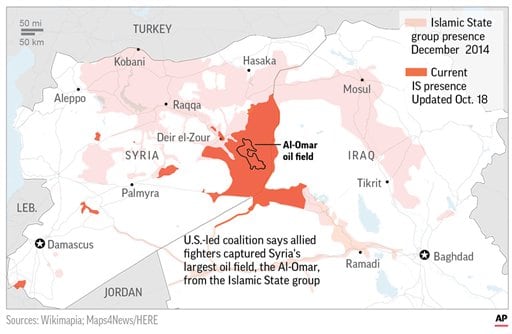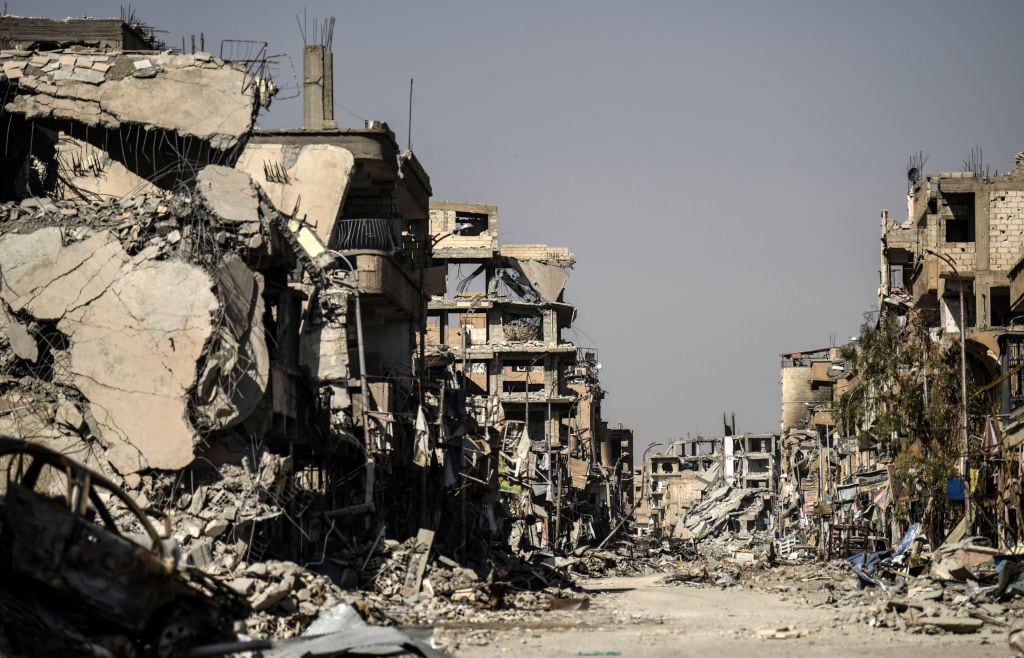BEIRUT — After losing major strongholds and key urban areas across Syria, including its self-proclaimed capital, the city of Raqqa, the Islamic State group now controls only 5 percent of the country’s territory, according to Russia’s defense minister.
That’s a dramatic decline from the height of the rise of ISIS in 2014, when the extremist group seized about a third of both Syria and Iraq, before its downfall began.
The remarks by Defense Minister Sergei Shoigu came as Russia-backed Syrian troops are pushing deeper into the eastern Syrian town of Mehkan, one of the few still held by ISIS.
Speaking at a conference in the Philippines, Shoigu said on Monday that “terrorists” — a term the Syrian government and its allies use for all armed opposition, including militant groups such as ISIS and al-Qaida’s Syria affiliate — controlled more than 70 percent of the country before Russia launched its air operation at the end of 2015 to support President Bashar Assad’s offensive against ISIS militants and opposition forces.
In Syria in 2015, ISIS briefly held nearly half of the country’s territory after the militants captured the historic city of Palmyra, parts of the northern Kurdish town of Kobani, the central desert and reached the city of Hassakeh in the northeast.
Later that year, ISIS started suffering setbacks that culminated with the fall last week of the northern city of Raqqa, the extremists’ de facto capital. ISIS has also lost wide areas it once controlled in Iraq, including the northern city of Mosul, the largest city the group had ever captured. U.S.-backed Iraqi government forces retook Mosul in July.
On Tuesday, Syria’s state news agency SANA said government forces captured several points inside the town of Mehkan just south of Mayadeen, the ISIS stronghold that Syrian troops captured earlier this month. Government forces are now advancing toward the town of Boukamal, the last that is still fully held by the extremists.
Russia has played a main role in helping government forces capture wide areas from ISIS in northern and central Syria by giving them air cover. In September, Syrian troops and their allies reached the eastern city of Deir el-Zour, where the extremists had long besieged the government-controlled part of the city.
However, Raqqa fell last week to the U.S.-backed Kurdish-led Syrian Democratic Forces, which have also been effective in eastern and northern regions of Syria.
Now, with the ISIS “caliphate” rapidly crumbling, a race is on between the U.S.-backed Kurdish forces and the Syrian government troops in the oil-rich Deir el-Zour province.
Syria’s state TV said warplanes of the U.S.-led coalition have bombed a government-controlled neighborhood in the city of Deir el-Zour, the provincial capital, killing 14 civilians.
U.S. military spokesman Col. Ryan Dillon denied the report, tweeting that the coalition has not bombed the city, of which ISIS currently controls a small part, since September.

The Britain-based Syrian Observatory for Human Rights, an activist group that tracks the conflict in Syria, said a Monday night airstrike killed 22 people but stressed that it was not clear whose warplanes were involved.
Last year, the U.S.-led coalition bombed Syrian army positions near the city of Deir el-Zour, killing at least 62 Syrian soldiers and leaving more than a 100 wounded.
More than 400,000 people have been killed in Syria and half the country’s prewar population displaced since the conflict erupted in March 2011.
Syrian opposition activists say malnutrition and medical shortages are increasing the suffering in besieged, rebel-held eastern suburbs of the capital, Damascus.
In the past two months, two children died of starvation, according to Rami Abdurrahman of the Observatory. Activists blame the government’s four-year siege of the area, as well as greed by local businessmen who hide food and medical products in orders to raise the prices.
The crisis in the suburbs, also known as Eastern Ghouta, has worsened since May after government forces seized the Qaboun and Barzeh neighborhoods in northeastern Damascus. The two neighborhoods were main points for smuggling supplies into the Ghouta region through tunnels.
International aid organizations have been sending food to Ghouta, home to tens of thousands of people, but the last convoy entered the area more than a month ago.
Ahmad Khansour, a Ghouta-based opposition activist, said in text messages that few can afford to buy food. A kilogram (2.2 pounds) of sugar sells for up to $12 while a kilogram of rice sells for nearly $5, he said, adding that an average family’s monthly income is about $100.
Associated Press writer Nataliya Vasilyeva in Moscow contributed to this report.




